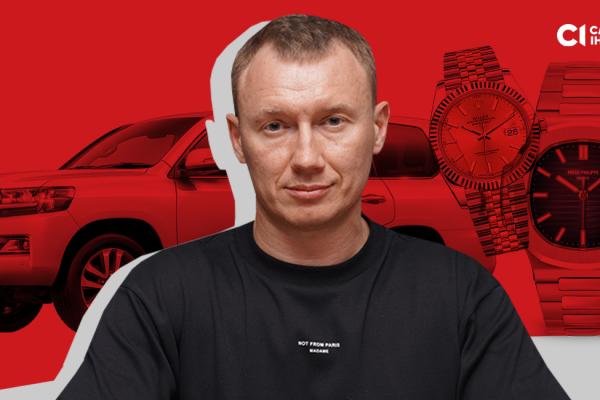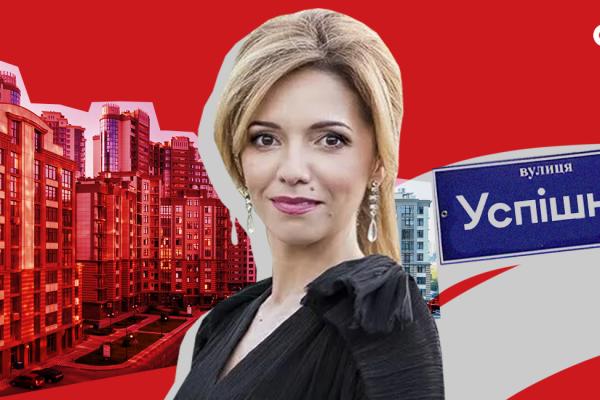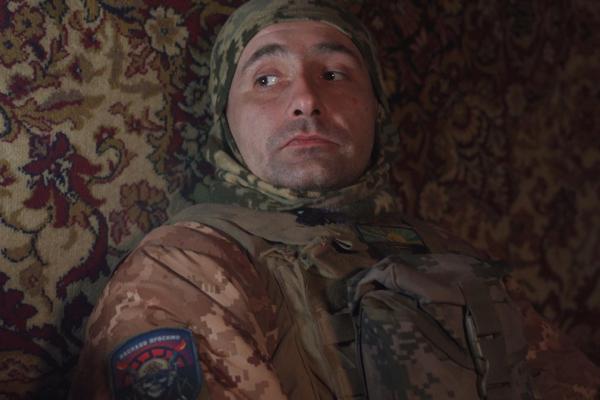“I don’t know what happened to him,” says director Mstyslav Chernov about the young man who is trapped under the rubble in the Oscar-winning documentary 20 Days in Mariupol. The Povnenky family: father — Maksym, mother — Maya, son — Ivan. They used to live in Kramatorsk, but moved to Mariupol on the Independence Day of Ukraine in 2021. They stayed there until 20 March 2022. Maksym worked for the State Emergency Service, so he and his family were in the rescue room during the explosion. Maksym Povnenkyi told Slidstvo.Info journalists about how he managed to escape, his son’s health and his future plans.
The journalists of Slidstvo.Info spoke to Maksym Povnenkyi, the father of Ivan, a young man who was trapped under the rubble and featured in the 20 Days in Mariupol documentary. The man is currently in the East, defending Ukraine from the Russian invaders.

Maksym Povnenkyi with his son Ivan
“I WAS LYING UNDER THE RUBBLE AND KEPT SCREAMING — MY SON ANSWERED, MY WIFE AND COLLEAGUE WERE SILENT”
With the start of the full-scale invasion, there was an opportunity to leave the city, but the Povnenky family decided not to separate. They believed that Mariupol had the best defences: fortifications, military equipment and personnel. But everything turned out to be completely different than in 2014.
“I work in the Emergency Prevention Department at the State Emergency Service, and Mariupol was already experiencing things that, as they say, ‘it’s too late to drink Borjomi’, it’s not time for prevention. So I volunteered. Our educational centre, Khalabuda, turned into a volunteer centre, and together with other members, I delivered food, firewood, medicines, and anything else we could do to help civilians and the military,” Maksym recalls.
On 7 March 2022, the Povnenky left their apartment and moved to the premises of the Mariupol State Emergency Service, where they lived with other colleagues and people from neighbouring houses destroyed by the Russians. On 10 March, Maksym decided to set up a women’s toilet on the 4th floor. His 15-year-old son Ivan and colleague Oleksiy helped him. The men had just brought water to the room. Back then, there was no connection, Maksym recalls, so his wife Maya tried to find her family in the building, and as soon as she did, the explosion occurred. The Povnenky family and Oleksii Pankov, a rescuer, were trapped in the rubble.
- The State Emergency Service building, photo from Povnenkyi’s archive
- The State Emergency Service building, photo from Povnenkyi’s archive
“I’m lying on my stomach. My left side is clamped, I am taking a breath every other time. I wasn’t crushed only because of the office chairs that supported the slab. But they were gradually flattening, and it was getting harder for me to breathe. I started a rescue operation, shouting: “Help!”. I also established sound contact with everyone I could,” Maksym recalls.
The man says that there was no one on the street, only a Tavria car with two dead people was on fire. They were driving past the building and the explosion happened.
I kept shouting, and Ivan answered, saying that his legs and arm were trapped. He was able to breathe freely. My head and my son’s head were sticking out into the street, but we were far away from each other. I could not hear my colleague or my wife. The shelling continued. There were explosions all around,” the rescuer says.
When the dust settled, Maksym’s colleagues ran out and saw a man and his son.
“They started the rescue operation with me. I was also cursing at them, because why not my son and wife. And then I realised that I was more or less easy to reach. The construction broke my ribs. But with the help of a hand-held mechanical tool, the rescuers removed everything from me. And there were reinforced concrete building blocks on top of my son. You can’t do anything with this type of tool. I went over the rubble to my son. Everything happened a little above the level of the second floor. We came down from the fourth floor,” the man says.
Maksym called for a “minute of silence”. Everyone stopped working. Only the explosions continued. Through the cannonade, Maksym’s voice could be heard, shouting the name of his Maya. He succeeded, and his wife responded. This helped them find her and get her out of the rubble.
“Later, I accidentally saw a photo of Yevhen Malolletka. When my son was being pulled out of the rubble, my wife was standing wrapped in a blue blanket and watching with fear. When I saw this photo, everything turned inside me. And when I saw the trailer for 20 Days in Mariupol, in which my wife is not just standing there, but shaking from the explosions, I started crying. It was a terrible day,” says Maksym.

His wife in a blanket / Photo by Yevhen Maloletka
After the rescuers freed Maksym’s wife, the two of them tried to calm their son while they waited for the crane to pull Ivan out.

A still from the film 20 Days in Mariupol, Ivan under the rubble
“I was holding his hand. At that moment, the rescuers had already freed my wife and we understood that the rescuers had to go for a crane to get our son. So, at that time, I tried to “talk some sense into” Ivan that we would travel, ride bikes, run, walk. Ivan had seen this scene from the film (this scene was included in 20 Days in Mariupol — ed.) My son is already an adult, but maybe he has seen much more than I would like him to at the age of almost 18,” says Maksym.
The man himself has not watched the film and doubts whether he will ever be able to do so. However, according to Maksym, he is glad that this documentary exists as proof of what happened in the city: “It should be watched by people who don’t understand what kind of horror was going on there.”
Maksym’s colleague never responded. No matter how many times they kept calling him, there was only silence. Oleksii Pankov was 39 years old and held the rank of major in the Civil Defence Service. Due to the powerful explosions around the area, his body was found only three months later by the so-called “DPR” (occupational Russian puppet forces — transl.) rescuers.
“TWO YEARS LATER, IVAN’S LEFT HIP HAS NOT FUSED UP YET”
From 10 to 20 March, the Povnenky family was in a Mariupol hospital. Ivan underwent surgery on the same day he was rescued from the rubble. However, it was no longer possible to carry out postoperative protocol measures in full, due to the lack of medicines and sanitary conditions. Maksym explained that it was these 10 days in Mariupol, without the possibility of evacuation, that influenced Ivan’s treatment.
On 19 March, the doctor told the Povnenkys that if they wanted to save their son, they had to evacuate from the city. The occupiers did not give permission for “green corridors” from Mariupol at that time. The family left on their own – in two cars, together with friends.
“Most of Mariupol was under occupation. We were stopped at checkpoints mostly by residents of the “DPR”. I’m from Makiivka, my wife is from Donetsk, and perhaps our Donetsk residence permit and wounded son saved us. But, of course, we were constantly searched, I was stripped, they checked for rifle butt marks and patriotic tattoos. It took us six hours to get from Mariupol to Dnipro. They met us in the evening of 20 March in the hospital. My son was immediately taken to the intensive care unit. We exhaled,” Maksym recalls.
In 2022, Ivan, accompanied by Maya, was transported from Ukraine to Poland by ambulance with four interchanges. Ivan was in serious condition, his body could not withstand the flight to the United States for treatment, but they managed to prepare him.

Ivan and Maya undergoing treatment in the United States / Photo: CHICAGO SUN-TIMES
“Now (12 March — ed.) Ivan has been undergoing another major surgery for half an hour, and it is planned to end in nine hours. Two years later, my son’s left hip has not yet fused. Doctors suspect that Ivan has lost the edges of the bone at the fracture site. Nevertheless, he is going through the ordeal with courage. “My wife has the hardest time in the US, she has been with the child who is constantly sick for three years now,” says Maksym.
When not in hospital, the mother and son live in a Polish diaspora house. Their home resembles a small dormitory.

Ivan and Maya undergoing treatment in the United States / Photo: CHICAGO SUNTIMES
“IVAN HAS NOTHING TO DO EXCEPT FOR TREATMENT AND STUDY”
Ivan finished school remotely. He flew to New York to take the National Multimedia Test. The number of points he scored allowed him to apply for admission to Ukrainian educational institutions. Currently, Ivan is a first-year student at the Kharkiv Academy of Physical Culture, majoring in Physical Therapy and Occupational Therapy.
Even before the full-scale invasion, he dreamed of becoming a rehabilitation therapist because he was involved in wrestling and saw how help was provided in practice. Now the circumstances have become even more acute, and every day he undergoes manipulations to maintain his condition, including those he studies at the academy.
“Ivan is studying hard, he has no other activities: only treatment and the online academy. Sometimes he even woke up at 1 am American time to take a test according to the Ukrainian schedule. But recently, on 26 February, he received a letter from the dean saying: “We remind you that you have given an official commitment to send a document on your military registration by 31 March. Otherwise, you will be expelled,” Maksym says.
When Ivan left Ukraine, he was 15 years old, and according to a resolution of the Cabinet of Ministers of Ukraine, young men must be registered at the age of 16. At the time, he was already in another country. For health reasons, he was unable to fly to Ukraine to register with the military commissariat during these two years, his father explains:
“We were convinced that Ivan’s health would improve and that all the issues with the documents would be resolved by 31 March, so we wrote an official receipt of commitment. On 5 September 2023, their son was supposed to have his last global surgery. But this ‘last’ one opened a Pandora’s Box, and new global problems were found for Ivan.”
According to Maksym, studying is something that psychologically supports his son: “He is constantly busy, if not with lectures, then with additional notes. Apart from treatment and studies, Ivan has no other occupation, and he is in danger of being left without the latter. He can’t go out to play football, people ask me: “Does he speak English well yet?” And Ivan is like a dog: he can explain to the doctors where he has pain and where he doesn’t. My son has no friends in the US, no active communication.”
According to Maksym, the possibility of expulsion from the Kharkiv Academy of Physical Culture has a significant impact on his son’s psychological state. He has already appealed to the Ministry of Defence and the Ministry of Education, but the family still hopes that the issue of his son’s continuing education will be resolved by the end of March.
“I really want to believe that my son will be able to continue to fulfil his dream of becoming a rehabilitation therapist,” hopes Ukrainian defender Maksym.
- Photo from the archive of the Povnenky family, Mariupol
- Photo from the archive of the Povnenky family
- Photo from the archive of the Povnenky family
- Photo from the archive of the Povnenky family









